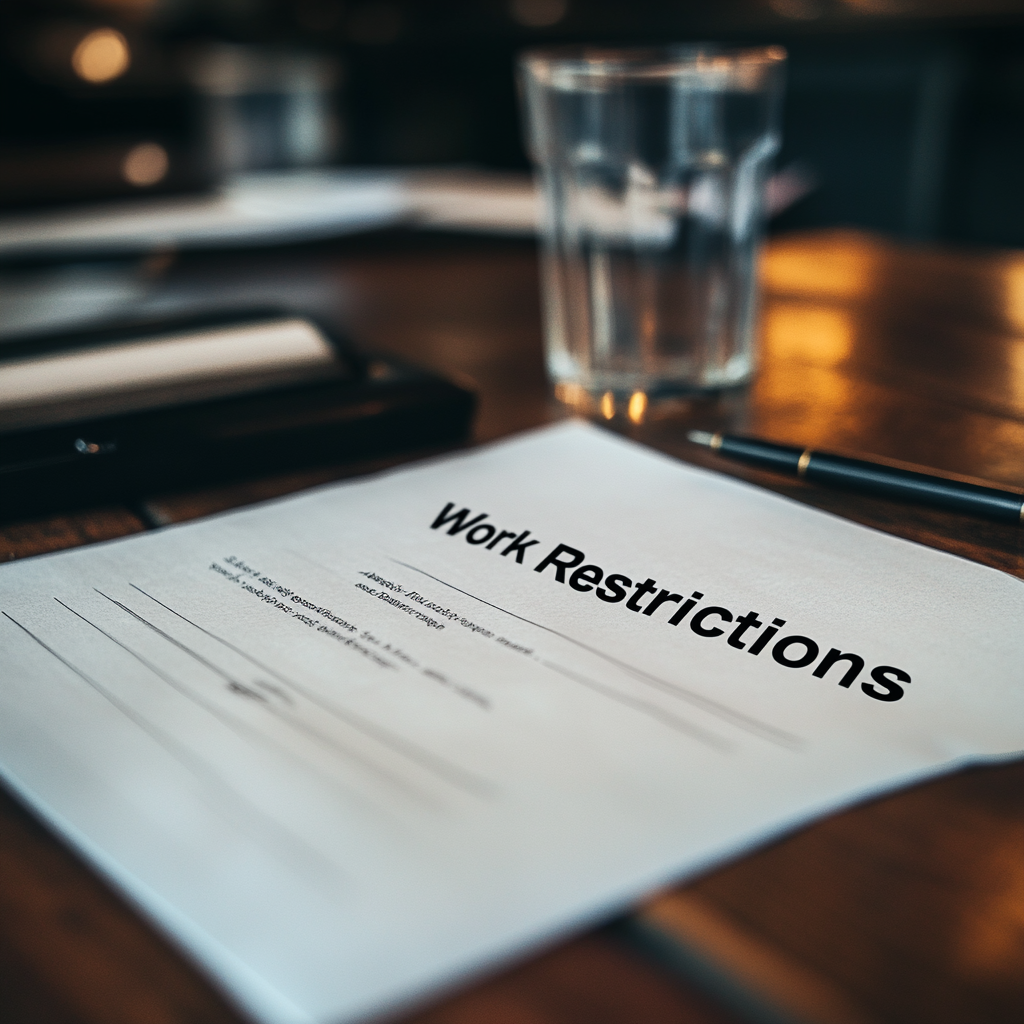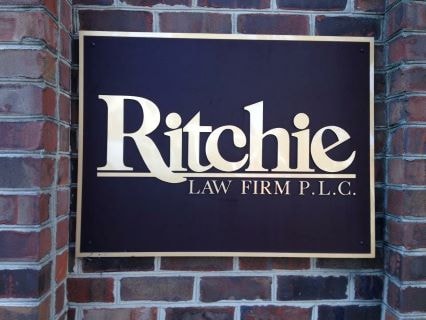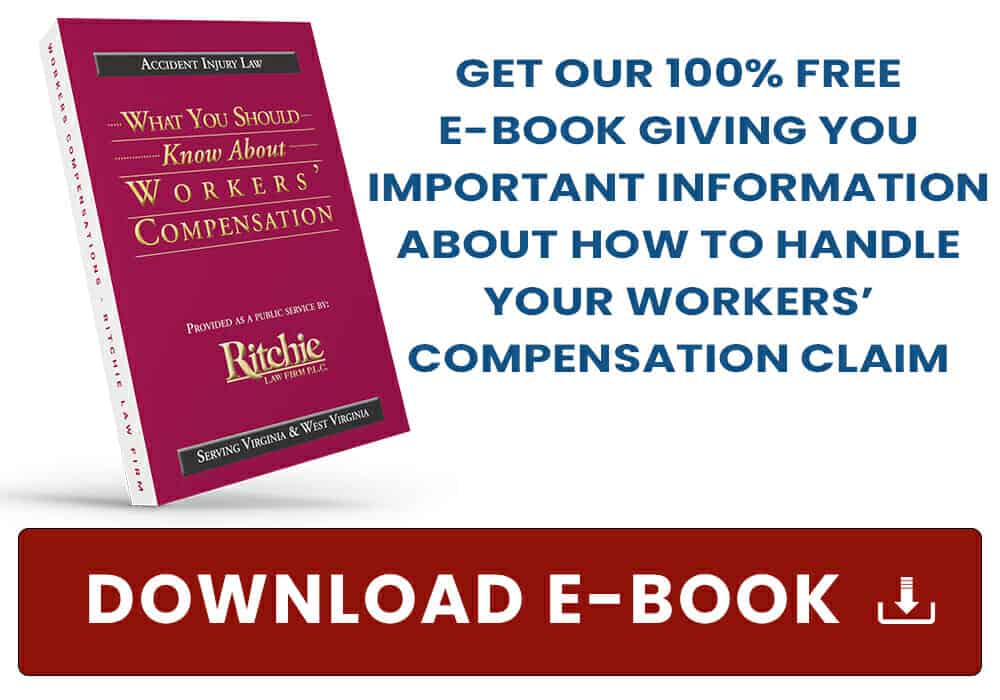Understanding Workers Compensation Light Duty: The Difference Between Out of Work And On Light-Duty In Virginia Workers’ Comp
If you’ve been injured on the job in Virginia, there’s an important difference between being put totally out of work and light duty. Understanding this difference is crucial for managing a workers compensation claim. In this article, we’ll try to answer some of the most asked questions about the differences between the two types of workers’ compensation benefits and important tips to protect your claim.
Workers’ compensation benefits are designed to cover lost wages when an employee is unable to work due to an injury, and this includes situations where the worker is on light duty but earning less than their pre-injury wages.
Completely unable to work or totally unable to work means just that – you are not able to work in any capacity at any job at this time.
Restricted duty or light duty means you are still able to work, but you might not be physically able to perform any or some of the tasks you did before you were injured.
Get It In Writing!
If your doctor puts you on light-duty or restricted duty, be sure they communicates your restrictions in writing very clearly so your employer understands what jobs you can’t do. It’s usually helpful for you to have an extra copy of these restrictions with you while you are at work.
Having clear written restrictions can also help in communications with the workers comp insurance company to ensure proper handling of your claim.
What is Light Duty Under Virginia Workers’ Compensation?
Light duty under Virginia workers’ compensation refers to a modified job assignment that is less physically or mentally demanding than an employee’s normal job duties. The goal of light duty is to allow an injured worker to return to work while still recovering from their injuries, thereby reducing the risk of re-injury and promoting a faster recovery. Light duty jobs may involve modified tasks, reduced work hours, or a different work environment. In Virginia, light duty is considered a form of “reasonable accommodation” that employers are encouraged to offer to injured workers.
Understanding Light Duty Work
Light duty work is a type of work that is less strenuous than a worker’s usual job. It is often assigned to employees who are recovering from a workplace injury or illness and are not yet able to perform their normal job duties. Light duty work can be a modified version of an employee’s old position or a completely different assignment. The goal of light duty work is to ease the employee back into the workforce while minimizing the risk of re-injury. Workers comp benefits can provide wage loss compensation if the light duty job pays less than the pre-injury wage.

Medical Work Restrictions and Limitations
Medical work restrictions and limitations are specific tasks that an injured worker is not allowed to perform due to their medical condition. These restrictions are usually provided by the worker’s treating physician and are intended to prevent further injury or exacerbation of the existing condition. Common medical work restrictions include limitations on lifting, bending, standing, and sitting. It is essential for employers to respect these restrictions and provide a safe working environment for the injured worker.
Getting Work Restrictions Authorized
To get work restrictions authorized, an injured worker should consult with their treating physician and provide written documentation of their medical restrictions. The physician should provide a detailed description of the worker’s limitations and any tasks that they are not allowed to perform. The worker should then provide this documentation to their employer, who is responsible for accommodating the worker’s medical restrictions.
Employer’s Obligation to Offer Light Duty Position
Under Virginia law, employers are not required to offer light duty positions to injured workers. However, if an employer does offer a light duty position, it must meet the employee’s medical restrictions and be approved by the employee’s treating physician. Employers who offer light duty positions must also ensure that the job is safe and suitable for the injured worker. If an employer fails to offer a light duty position that meets these requirements, the injured worker may be entitled to continue receiving workers’ compensation benefits.

Employee’s Obligation to Accept Light Duty Work
In Virginia, injured workers are not required to accept a light duty job offer from their employer. However, if an injured worker refuses a light duty job offer without a valid reason, they may risk losing their workers’ compensation benefits. To avoid this, injured workers should carefully review the light duty job offer to ensure that it meets their medical restrictions and is safe and suitable for their condition. If an injured worker is unsure about whether to accept a light duty job offer, they should consult with their treating physician and a workers’ compensation attorney.
Can I Do My Own Job?
In many cases, working light duty or restricted duty means that you’ll be doing a different job than before you were injured. If your employer has a job for you that fits your restrictions, you are usually expected to do that job . . . even if the work is not something you like doing. Refusing a light duty job offer from your employer is often considered voluntary abandonment of your job and can hurt your workers’ comp case.
What If My Employer Wants Me To Do Work Outside My Restrictions?
It is usually thought to be your responsibility to make sure that you are working within your restrictions. If your employer asks you to do a job that is outside the restrictions given by your doctor, it means the light duty position is not suitable. Politely inform your employer that you are very willing to work. But, you aren’t able to perform the job right now because it is outside your doctor’s restrictions. Unfortunately, violating your doctor’s restrictions can hurt your Virginia workers’ compensation case.
Are Restrictions On My Driving Considered Light Duty Restrictions?
Restrictions on driving DOES NOT mean you are totally unable to work. Usually, transportation to and from your job is your responsibility. While not being able to drive is very inconvenient for you, the Virginia Workers’ Compensation Commission does not view it as a justifiable reason for missing work.
What If My Employer Can’t Give A Job That Fits My Restrictions?
If your doctor puts you on light duty restrictions and your employer can’t give you a job to fit those restrictions, then you will have to look for any light duty jobs that fit your restrictions. This means that you will need to do job searches and also, perhaps, work with a vocational rehabilitation counselor provided by the insurance company.
Refusing Light Duty Work
An injured worker may refuse light duty work if it does not accommodate their medical restrictions or if they are not physically or mentally able to perform the tasks required. However, refusing light duty work can affect the worker’s eligibility for workers’ compensation benefits. If an employer offers a light duty job that accommodates the worker’s medical restrictions, and the worker refuses to accept it, their benefits may be reduced or terminated.
Returning to Regular Work After Light Duty
Once an injured worker has completed a light duty assignment, they may be able to return to their regular job duties. However, this is not always the case. If an injured worker is still experiencing symptoms or limitations related to their injury, they may need to continue working in a light duty capacity or seek additional medical treatment. In some cases, an injured worker may be able to return to their regular job duties with accommodations or modifications to ensure their safety and well-being.
Vocational Rehabilitation and Education
In some cases, injured workers may be eligible for vocational rehabilitation and education benefits as part of their workers’ compensation claim. Vocational rehabilitation is a process that helps injured workers develop new skills and find new employment opportunities that are suitable for their condition. Education benefits may also be available to help injured workers pursue further education or training to enhance their career prospects. In Virginia, vocational rehabilitation and education benefits are typically provided by the workers’ compensation insurance company or the employer.
Pay and Benefits
If an injured worker accepts a light duty job, their light duty wages may be lower than their regular wages, impacting their overall compensation during recovery. In Virginia, employers are not required to pay light duty workers the same salary level as their pre-injury pay. However, if the light duty job pays less than the worker’s pre-injury wage, they may be entitled to receive partial disability payments. Workers’ compensation will continue to pay all reasonable and necessary work-injury related medical expenses. Benefits may start again if an employee is laid off, fired without cause, or taken off work by their doctor while working a light-duty assignment.

Talk To a Virginia Workers’ Compensation Lawyer About Workers Compensation Benefits
If you’ve been injured on the job, it is wise to talk to a lawyer who is experienced in workers’ compensation claims. At the Ritchie Law Firm, you can talk to us for FREE . . . NO STRINGS ATTACHED! We can give you advice on your claim before you make a decision that could damage your case. Check out our article on “How Much Does a Workers’ Comp Lawyer Cost” here.
For more than 45 years, the Ritchie Law Firm has successfully helped thousands of injured workers navigate the complex workers’ compensation process. The Ritchie Law Firm specializes in serving injury victims. We never represent insurance companies or corporations. If your workers’ compensation case is going to hearing, you will want a trial expert on your side. We are board certified trial specialists through the National Board of Trial Advocacy. The attorney you choose for your workers’ compensation case can make all the difference.
Virginia Workers’ compensation is a complex system that can be very difficult to navigate. Be very careful to make certain that your rights are protected before you sign anything. Talking to our workers’ comp lawyers about your claim is free. If we take your case, we don’t get a fee unless we win your case. There is no risk to you to get some information about your case before you make any decision that might negatively affect its outcome.
Choose wisely. . . you can talk to us for FREE.
Call today 540-388-0536
fill out the form below or download our free ebook in the side panel.
Ritchie Law Firm serves injured workers in all of Virginia while helping clients in cities and surrounding areas of Harrisonburg, Charlottesville, Staunton, and Winchester. Check out case studies from some of the cases we’ve handled by clicking here.



